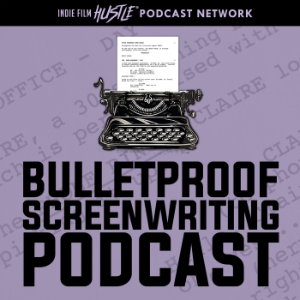
Bulletproof Screenwriting™ Podcast
Film & TV News
The Bulletproof Screenwriting Podcast shows you how to make your screenplays bulletproof. Weekly interviews with Oscar® and Emmy® award winning screenwriters, story specialists, best-selling authors, Hollywood agents and managers, and industry insiders. We cover every aspect of the screenwriting process. This is the screenwriting podcast for the rest of us. No fluff. No BS. Just straight talk that will help you on your screenwriting journey.
Some of the past guests include 3X Oscar® Winning Writer/Director Oliver Stone, Eric Roth (Dune, Forest Gump), Edgar Wright (Shaun of the Dead), Richard Linklater (Boyhood, Slacker) James V. Hart (Dracula, Hook), John August (Big Fish, Aladdin), Jim Uhls ( Fight Club), Peter Rader (Waterworld), Diane Drake (What Women Want), Daniel Knauf (Carnival, Blacklist), Derek Kolstad (John Wick) and Pen Densham (Robin Hood, Backdraft) to name a few.
Become a supporter of this podcast: https://www.spreaker.com/podcast/bulletproof-screenwriting-podcast--2881148/support.
Location:
United States
Description:
The Bulletproof Screenwriting Podcast shows you how to make your screenplays bulletproof. Weekly interviews with Oscar® and Emmy® award winning screenwriters, story specialists, best-selling authors, Hollywood agents and managers, and industry insiders. We cover every aspect of the screenwriting process. This is the screenwriting podcast for the rest of us. No fluff. No BS. Just straight talk that will help you on your screenwriting journey. Some of the past guests include 3X Oscar® Winning Writer/Director Oliver Stone, Eric Roth (Dune, Forest Gump), Edgar Wright (Shaun of the Dead), Richard Linklater (Boyhood, Slacker) James V. Hart (Dracula, Hook), John August (Big Fish, Aladdin), Jim Uhls ( Fight Club), Peter Rader (Waterworld), Diane Drake (What Women Want), Daniel Knauf (Carnival, Blacklist), Derek Kolstad (John Wick) and Pen Densham (Robin Hood, Backdraft) to name a few. Become a supporter of this podcast: https://www.spreaker.com/podcast/bulletproof-screenwriting-podcast--2881148/support.
Twitter:
@bpscreenplay
Language:
English
BPS 445: What Every Indie Filmmaker Can Learn from a $5K Zombie Movie with Bojan Dulabic
Duration:01:26:42
BPS 444: Phil Proctor: A Journey Through Comedy, Resilience, and the Art of Reality
Duration:00:55:33
BPS 443: Breaking the Mold: Lily Yasuda and Michael Wolfe’s Journey to Crafting the Anti-Rom-Com
Duration:00:47:41
BPS 442: The No-Excuses Filmmaking Philosophy of Len Kabasinski
Duration:00:52:47
BPS 441: Comedy, Confidence, and the Art of Reinvention with Rhonda Shear
Duration:00:56:52
BPS 440: Crafting Authentic Stories from Lady Gaga to Sci-Fi Futures with Kim Ray
Duration:01:10:47
BPS 439: From Wrestling Rings to Public Access Mayhem: The Wild Ride of Mad Man Pondo
Duration:00:56:07
BPS 438: Why Your Script Still Isn’t Getting Read; And What to Do About It with Whitney Davis
Duration:00:49:11
BPS 437: No Budget, All Hustle: The Filmmaking Grind of Staci Layne Wilson
Duration:00:43:32
BPS 436: Lessons in Filmmaking, Failure, and Persistence with Greg Travis
Duration:00:54:01
BPS 435: Building Films from Scratch_Mastering Microbudget Movie-Making with Evan Kidd
Duration:01:01:30
BPS 434: How Pixar’s Story Secrets Can Transform Your Filmmaking Process with Brit Cruise
Duration:00:52:17
BPS 433: No Film School, No Problem Gary King's Journey of Grit and Creativity
Duration:01:12:34
BPS 432: Making Your Own Damn Movies: Inside Dave Campfield’s Troma-Fueled Filmmaking Path
Duration:00:57:22
BPS 431: How Tremors turned into a Masterclass in Storytelling with S.S Wilson
Duration:00:37:37
BPS 430: Shooting Sharks in Your Living Room: The Art of DIY Filmmaking with Ron Bonk
Duration:00:58:18
BPS 429: The Unfiltered History of Film Distribution with AFM Co-Founder with Michael Ryan
Duration:01:15:56
BPS 428: The Art of Film Marketing: How to Make Your Movie Impossible to Ignore with Danielle Raiz
Duration:00:32:58
BPS 427: From Pills to Pictures: Cynthia Hill’s Unlikely Path to Documentary Filmmaking
Duration:00:56:09
BPS 426: Breaking the Rules: Crafting Powerful Films Without Hollywood Money with Shawn Whitney
Duration:00:51:56